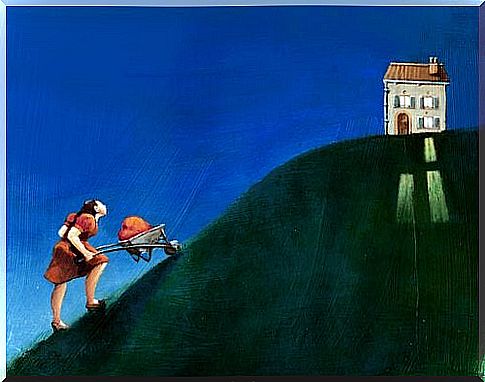Success And Failure: In Life, We Write, We Erase, And We Rewrite

Walt Disney was fired from the newspaper he worked for for lack of creativity.
He then founded his first company, Laugh-O-Gram Films, dedicated to animation, but quickly, he was forced to end it.
Eventually he went to Hollywood, and his films finally started to be successful.
“I can’t believe that there are insurmountable obstacles for people who know how to make their dreams come true.”
-Walt Disney-
There are many stories like that of Walt Disney. At one point or another in our lives, we have all gone through times of failure where it was necessary to put things right and start over.
Success, failure and learning are part of our daily life. These are the basics that allow us to grow as a person.
This is why, in life, we write, erase and rewrite.
To be successful in life: what does it mean, more exactly?
What does being successful mean to you? Is it being recognized in your work? Is it being happy in your life?
Do you feel good with yourself and with others? Is it having money or wealth? Is it having a family?
Is it having a companion or children? Is it traveling all over the world? Is it having a job and health?
“90% of our success depends on our ability to insist.”
-Woody Allen
Regardless of the definition you personally give to success, know that it allows you to gain self-confidence, to move forward, and therefore to be happy.
Elsa Punset, writer, philosopher and daughter of Eduardo Punset, talks about the “winning effect”.
When you feel that you are succeeding, that you are therefore “winning”, your brain secretes dopamine, which allows you to feel better and more prepared, and therefore to make all possible efforts to meet the challenges you want to meet. .
In other words, being successful leads to more success : it is a chain effect.
Learn from failure
In order to help you better understand what success and failure is, we have decided to share this amazing information with you: According to some estimates, it seems that 90% of products launched in the market are not generating the expected sales. and fail.
Failure is therefore not an exception, but a general rule. However, failing is not well received.

Now that you know that failure is common for everyone, you will certainly be able to live with it in a more natural way.
For Carol Dweck, psychologist, the way you cope with failure is proportional to your talent.
“Failure is the opportunity to start over, with greater confidence.”
-Henry Ford-
According to one approach, talent is something innate; we are born with it or not, quite simply.
However, another approach maintains that talent develops, and that with perseverance and effort, we can achieve what we want.
For people in the first group, taking up challenges is a way of demonstrating their innate talent.
According to them, failure means that they do not have sufficient skills or talent; this is the reason why they are afraid of failure, because they cannot stand the idea of not succeeding.
However, people who think talent grows see failure as proof that they are making an effort, and see it from a positive point of view.
Failure is a way for them to improve. If you don’t fail, you can’t improve yourself.
Learning from your failures and assuming the risks requires a lot of courage. Everything will not always go well, we will experience many disappointments, but our real success will be that of learning, maturing and growing.
Think about what makes you happy, what puts a smile on your face, and fight for it.
Emotional intelligence and success
In his book Emotional Intelligence (published in 1995), Daniel Goleman cites various studies presenting the case of several young people obtaining very good results in intelligence tests.

As part of these studies, researchers compared the levels of satisfaction of these young people with concepts such as happiness, prestige or professional success.
It was then concluded that the intelligence quotient assumes approximately 20% of the factors that determine success.
The remaining 80% depend on variables such as luck, social class and most importantly, emotional intelligence.
Therefore, self-motivation, the ability to persevere, managing moods and empathy are more determining factors than intelligence.
“In life, you don’t win and you don’t lose either, you don’t fail and you don’t triumph either. In life, we learn, we grow, we discover; we write, we erase and we rewrite; we sew, we unstitch and we sew again. ”
-Ana Cecilia Blum-







